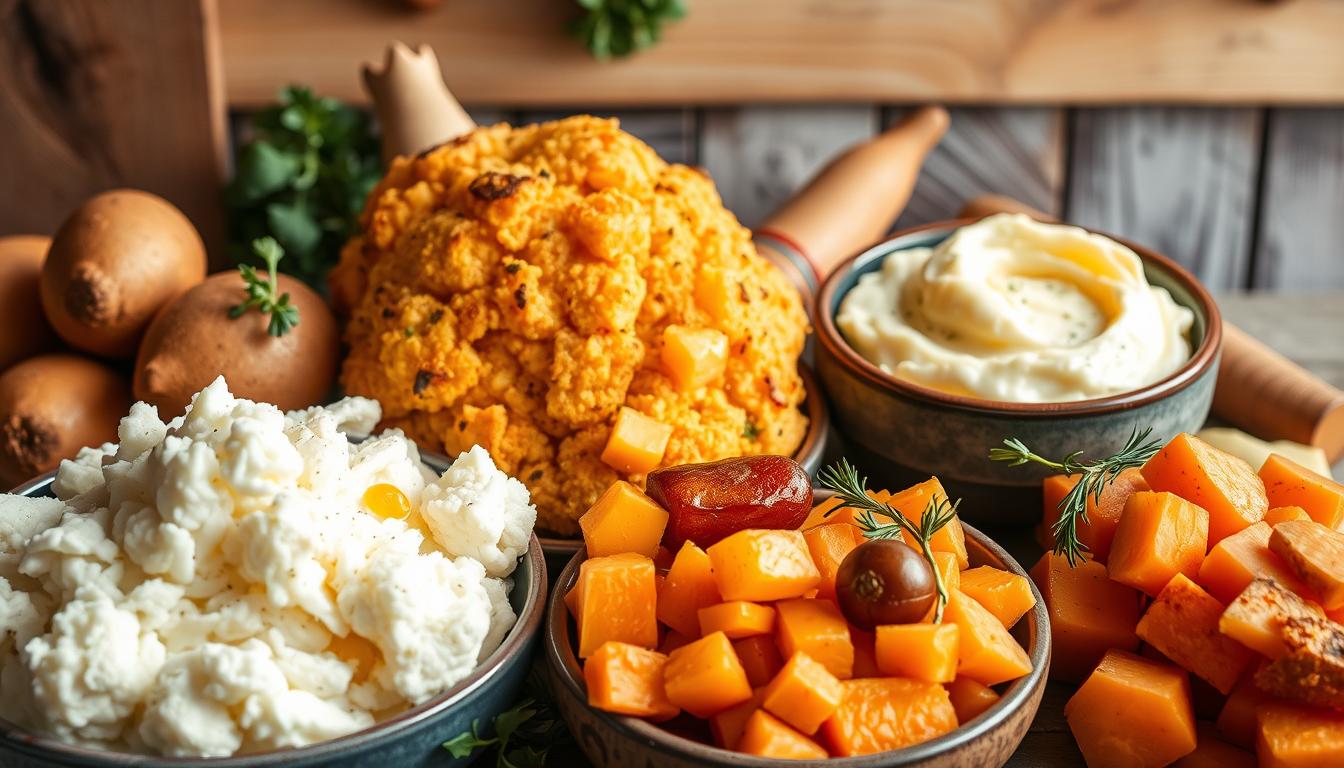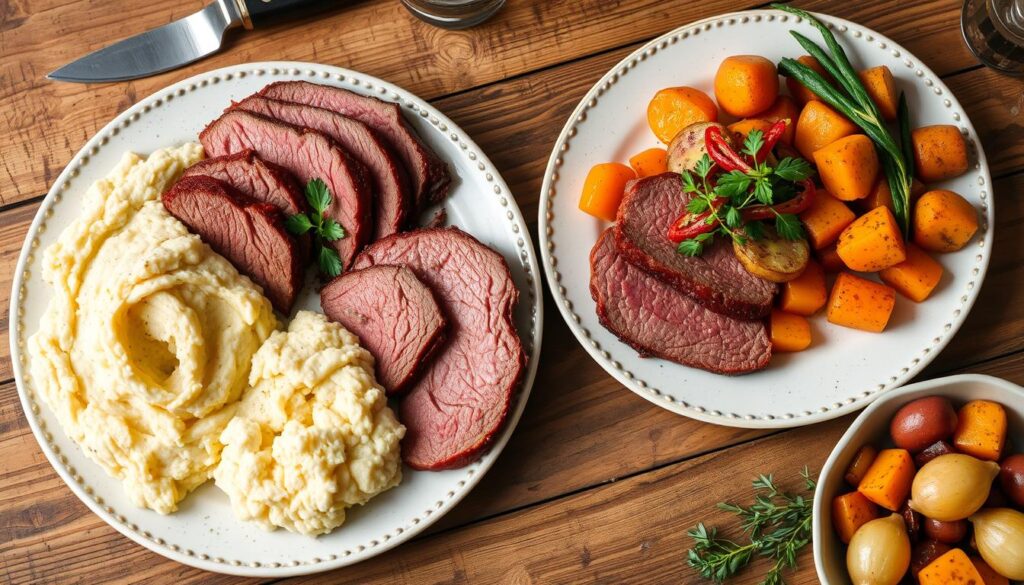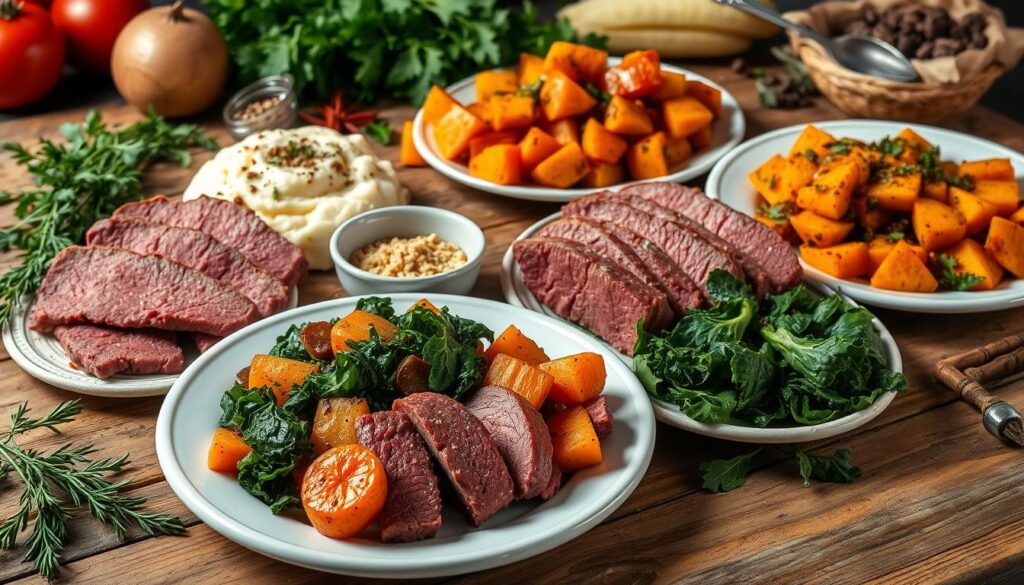I love breakfast, Best Substitutes for Potatoes in Corned Beef Dishes. The salty corned beef and the warm potatoes are perfect together. But, I’ve started looking for other options because of changing diets and health goals.
In this article, we’ll find the Best Substitutes for Potatoes in Corned Beef Dishes. This way, you can enjoy your favorite meal while meeting your dietary needs or preferences.
Key Takeaways
- Canned corned beef is a versatile ingredient that can be used in various breakfast dishes, offering a high-protein option.
- Understanding the proper preparation and cooking techniques for canned corned beef can elevate traditional dishes.
- Exploring potato alternatives, such as cauliflower, turnips, and sweet potatoes, can provide nutritious and flavorful substitutions.
- Incorporating low-carb side dishes can cater to dietary preferences while maintaining the delicious taste of corned beef.
- Experimenting with different cooking methods and flavor pairings can help you create unique and satisfying corned beef breakfast dishes.
Understanding Corned Beef and Potatoes
Corned beef and potatoes is a classic combo loved for generations. Potatoes do more than just accompany the dish; they balance flavors and add texture. They make the dish satisfying, tempering the corned beef’s saltiness.
Nutritional Benefits of Potatoes
Potatoes add more than just taste to corned beef meals. They’re packed with vitamin C, potassium, and fiber. They also give you energy with their carbs.
Flavor Pairing with Corned Beef
Potatoes balance the salty flavor of corned beef. They soak up the meat’s juices, adding texture. This combo shows how simple pairings can be powerful.
While potatoes are key in corned beef dishes, trying other veggies can bring new flavors. Knowing potatoes’ role helps you choose substitutes that keep the dish’s essence while meeting different tastes or needs.
Why Consider Substitutes for Potatoes?
Traditional corned beef dishes often pair with potatoes. But, there are good reasons to look at potato-free diets and low-carb options. Trying out different vegetables can meet dietary needs, avoid allergies, and bring new flavors to your meals.
Dietary Restrictions and Allergies
People on low-carb, keto, or paleo diets might not eat potatoes. Instead, they can try cauliflower, turnips, or rutabaga. These veggies are not only tasty but also packed with nutrients.
Nutritional Alternatives
Many potato substitutes have unique nutritional benefits. Cauliflower, for example, is full of vitamins and minerals. Turnips are high in fiber. These options can make your meals more nutritious and balanced.
Adding Variety to Meals
Using potato substitutes in corned beef dishes can make them more interesting. Each vegetable adds its own texture, taste, and experience. This variety can make your meals more exciting and prevent boredom.
Exploring potato substitutes can meet different dietary needs and add fun to your meals. It opens up new possibilities for your cooking, offering a variety of options to suit your taste and needs.
Cauliflower: A Versatile Option
Cauliflower is a great choice for low-carb corned beef sides. It’s a keto-friendly option that can replace potatoes in many dishes. You can make cauliflower rice or roast the florets for endless possibilities.
Preparing Cauliflower for Corned Beef
To use cauliflower in your corned beef meals, you can prepare it in different ways. Steam or boil the florets until they’re tender. Then, mash them with butter, herbs, and spices for a potato-like texture.
You can also pulse raw cauliflower in a food processor to make cauliflower rice. This can be a great substitute for traditional rice or potatoes.
Cooking Techniques
- Steaming: Quickly cook cauliflower florets in a steamer basket for a tender, mild-flavored base.
- Roasting: Toss cauliflower florets with oil, salt, and pepper, then roast at high heat for a delightful caramelized texture.
- Sautéing: Sauté riced cauliflower in a skillet with aromatics like garlic and onions for a flavorful alternative to traditional corned beef sides.
Flavor Enhancements
To make cauliflower taste better in your corned beef dishes, add herbs, spices, or cheese. Garlic, rosemary, and Parmesan can make simple cauliflower a tasty side dish. Try different seasonings to find the perfect match for your corned beef.
Cauliflower is a great low-carb and nutritious substitute for potatoes in corned beef meals. By trying different cooking methods and flavors, you can make keto-friendly, low-carb sides that are both tasty and healthy.
Turnips: A Flavorful Alternative
Want to mix up your corned beef dishes? Try using turnips instead of potatoes. They have a peppery taste and a crisp texture. This adds a unique twist to your favorite recipes.
Preparing Turnips for Maximum Flavor
To get the most out of turnips, prepare them right. Roasting them caramelizes their sugars, creating a sweet and earthy flavor. You can also mash them with butter and spices for a creamy side dish.
Turnip Variations to Enhance Dishes
- Use both the turnip root and greens for a nutrient-rich dish. The greens can be sautéed or added to soups and stews.
- Try turnip fries or hash browns for a crunchy side dish.
- Add turnips to casseroles, pot roasts, or even turnip au gratin for a creamy dish.
Nutritional Profile of Turnips
Turnips are great for low-carb diets. They’re full of vitamins and minerals like vitamin C, fiber, and antioxidants. They have less carbs than potatoes, so you can enjoy corned beef without the heavy carbs.
“Turnips offer a unique twist on traditional corned beef and potato dishes, providing a flavorful and nutritious alternative.”
Adding turnips to your corned beef recipes brings new flavors and textures. Whether roasted, mashed, or in creative dishes, turnips are a great choice for your next meal.
Carrots: Sweet and Savory
Carrots are a great choice to replace potatoes in corned beef dishes. They mix sweetness with savory flavors, matching well with corned beef’s salty taste. Adding carrots to your meals makes them not only tasty but also healthy and colorful.
How to Incorporate Carrots in Recipes
You can use carrots in many ways with corned beef. Roasting them with a honey or maple syrup glaze brings out their sweetness. Or, mash them for a creamy side dish. For a crunchy texture, slice or julienne them and sauté with onions and garlic.
Cooking Methods for Carrots
- Steaming: Steaming carrots keeps them tender and colorful.
- Roasting: Roasting carrots caramelizes their sugars, adding flavor.
- Sautéing: Sautéing carrots with onions and garlic adds a tasty twist.
Flavor Pairing with Corned Beef
Carrots’ sweetness pairs well with corned beef’s saltiness. This mix creates a balanced flavor that looks and tastes great. Adding fresh herbs or a bit of citrus zest can make it even better.
“Carrots are a game-changer in corned beef dishes, providing a sweet and savory contrast that takes the meal to new heights.”
Rutabaga: A Unique Option
Looking for a nutritious, lower-carb potato substitute for your corned beef dishes? Rutabaga could be the perfect choice. It has a unique flavor that pairs well with corned beef.
Preparing Rutabaga for Corned Beef Dishes
Preparing rutabaga for your meals might take some effort. But the result is worth it. Start by peeling the tough skin, which can be tricky. Then, cut it into even pieces for even cooking.
Cooking Tips and Tricks
- Roast rutabaga in the oven at 400°F for about 30 minutes, tossing halfway, until tender and lightly browned.
- Mash cooked rutabaga with a bit of butter, garlic, and seasonings for a creamy, flavorful side dish.
- Add diced rutabaga to stews and braises, allowing it to soak up the rich, savory flavors of the corned beef.
Nutritional Insights
Rutabaga is a nutritional powerhouse. It’s packed with vitamins, minerals, and fiber. A cup of cooked rutabaga has only about 9 grams of net carbs, much less than potatoes.
It’s also rich in antioxidants, helping prevent diseases and improve skin health. Its sweet and earthy flavor complements corned beef well, making for a nutritious meal.
“Rutabaga is a versatile root vegetable that can be a game-changer in your corned beef recipes. Its lower carb content and unique flavor profile make it a fantastic substitute for potatoes.”
Looking to cut carbs, try new flavors, or add more nutrients to your diet? Rutabaga is a great choice. Try different cooking methods and enjoy its unique taste in your corned beef dishes.
Sweet Potatoes: A Natural Sweetness
Looking for a natural sweetness for your corned beef dishes? Sweet potatoes are a great choice. They add color and nutritional value, making them a better option than regular potatoes.
Benefits of Using Sweet Potatoes
Sweet potatoes are full of vitamins and minerals. They have lots of vitamin A, which is good for your eyes and immune system. They also have fiber, which helps with digestion and keeps you full. Plus, they have antioxidants that protect your cells.
Preparing Sweet Potatoes Properly
To enjoy sweet potatoes with corned beef, prepare them right. Roasting sweet potato wedges or cubes brings out their sweetness. You can also mash them with butter, milk, and spices like cinnamon and nutmeg for a creamy side.
Pairing Sweet Potatoes with Corned Beef
The salty taste of corned beef goes well with sweet potatoes’ natural sweetness. Serve them roasted, mashed, or in a gratin for a tasty dish. The sweet potatoes’ orange color also makes the dish look good.
Sweet potatoes have more carbs than some potato substitutes. But they are nutritious and flavorful. Try different sweet potato recipes to find the best match for your corned beef.
Cabbage: A Classic Companion
Cabbage is a top pick for Irish dishes, especially with corned beef. It’s a low-carb veggie that’s tasty and healthy. This makes it great for those looking to mix up their corned beef meals.
How Cabbage Complements Corned Beef
Cabbage’s mild taste pairs well with corned beef’s rich flavors. Its sweet and earthy notes balance the meat’s saltiness. The crunchy cabbage also contrasts nicely with the tender corned beef.
Cooking Styles to Enhance Flavor
- Braising: Simmering cabbage in the corned beef liquid makes it tender and flavorful.
- Sautéing: Sautéing shredded cabbage with garlic and butter brings out its sweetness.
- Roasting: Roasting cabbage wedges with olive oil and spices gives them a crispy texture.
Nutritional Benefits of Cabbage
Cabbage is packed with health benefits. It’s low in calories and carbs, perfect for low-carb diets. It’s also full of vitamin C, fiber, and antioxidants, making it a nutritious side to corned beef.
Cabbage is a classic side for corned beef, adding flavor, texture, and nutrition. Its versatility makes it a great choice for anyone enjoying cabbage and corned beef together.
Quinoa: A Healthy Grain Alternative
Quinoa is a great choice for corned beef dishes instead of potatoes. It’s packed with protein and pairs well with corned beef’s bold flavors. This makes for a healthy and filling meal.
Quinoa as a Base for Corned Beef
Quinoa’s fluffy texture and nutty taste are perfect for corned beef dishes. It’s a complete protein, adding nutrition to your meals.
Prepping Quinoa for Flavor
Rinse quinoa well under running water before cooking. This removes a bitter coating. Cooking it in broth adds extra flavor that goes well with corned beef.
Nutritional Aspects of Quinoa
Quinoa is full of nutrients. It’s a complete protein and rich in fiber, iron, magnesium, and B vitamins. It’s also gluten-free, making it great for those who can’t eat gluten.
Quinoa is a versatile and nutritious choice for corned beef dishes. Try different quinoa recipes to make your meals even better.
Serving Suggestions for Potato Substitutes
Enjoying corned beef without potatoes opens up a world of possibilities. You can use various vegetables to make your meals tasty and good-looking. This way, you can meet different dietary needs and tastes.
Combining Substitutes with Corned Beef
Feel free to mix different vegetables to add texture and flavor to your corned beef. Try pairing soft cauliflower with crunchy turnips or sweet carrots. This mix of textures and tastes will make your meal exciting.
Presentation Ideas
Make your corned beef dish stand out by how you arrange the vegetables. Cut them into shapes that add color to your plate. You could layer mashed rutabaga with sweet potato slices and sautéed cabbage.
Enhancing with Sauces and Seasonings
Add tasty sauces and spices to your corned beef and vegetables. A tangy mustard sauce or zesty horseradish cream can be a great contrast. Sprinkle garlic, thyme, or caraway seeds to bring all the flavors together.
By trying out different vegetables and creative ways to serve them, you can make your corned beef dishes more satisfying. They will look great and taste even better.
Final Thoughts on Substituting Potatoes
Exploring corned beef recipes opens up a world of options. You can find many vegetable variety substitutes for potatoes. These alternatives can add new flavors to your meals, whether you’re adapting to a diet or just want to try something new.
Choosing the Right Substitute for Your Meal
Think about what you like, your dietary needs, and the taste you want. Cauliflower, turnips, carrots, and rutabagas are great choices. They offer different textures and tastes that go well with corned beef.
Experimenting with Different Vegetables
- Try cauliflower, which can be roasted, mashed, or riced like potatoes.
- Turnips add a unique flavor, with their earthy and sweet taste.
- Carrots bring sweetness and a crunchy texture to your meals.
- Rutabagas offer a special texture and flavor, perfect for corned beef and cabbage.
Embracing New Flavors in Traditional Dishes
Using different vegetables instead of potatoes lets you explore new flavors. It’s a chance to make innovative corned beef recipes. You can use a variety of vegetables that fit your taste and dietary needs.
“Variety is the spice of life, and the same holds true for our culinary adventures. Stepping outside the traditional potato comfort zone can lead to delightful discoveries and a newfound appreciation for the abundant vegetable variety that can elevate our favorite dishes.”
Frequently Asked Questions
Substituting potatoes in corned beef dishes can raise many questions. Knowing how to cook with different vegetables is key to a great meal.
Common Questions about Substitutes
Do cooking times change with substitutes like cauliflower, turnips, or sweet potatoes? Yes, they can be a bit different. Cauliflower and turnips might cook faster, while sweet potatoes take longer. It’s important to check their texture to get them just right.
Tips for Cooking with Substitutes
When using potato substitutes, remember to adjust the seasoning. These veggies might need different herbs and spices to match the corned beef’s taste. Try adding garlic, onion, and herbs to find the right flavor.
How to Store Leftover Ingredients
Proper storage is crucial for leftover ingredients. Keep cooked veggies and corned beef in separate, airtight containers in the fridge. This keeps them fresh and prevents contamination. Just reheat and mix when you’re ready to enjoy.
FAQ
What is a good substitute for potatoes in corned beef dishes?
Good substitutes for potatoes include cauliflower, turnips, carrots, rutabaga, sweet potatoes, cabbage, and quinoa. These options offer different textures and flavors. They also provide nutritional benefits that match well with corned beef.
How can I prepare cauliflower as a potato substitute in corned beef meals?
You can prepare cauliflower in several ways for corned beef dishes. Try ricing, roasting, or mashing it to get a potato-like texture. Add herbs, spices, or cheese to enhance the flavor and match it with the corned beef.
What are the benefits of using turnips as a potato alternative in corned beef dishes?
Turnips are a tasty potato substitute with a peppery taste and crisp texture. They’re great roasted, mashed, or in stews. Turnips are also packed with vitamin C, fiber, and antioxidants, making them good for low-carb diets.
How can I incorporate carrots into my corned beef dishes?
Carrots add a sweet and savory touch to corned beef meals. Roast, glaze, or mash them to balance the saltiness of the corned beef. They’re full of beta-carotene, fiber, and antioxidants, making them a healthy choice.
What is the unique flavor profile of rutabaga, and how can it be used in corned beef dishes?
Rutabaga has a sweet and earthy taste that goes well with corned beef. It’s great roasted, mashed, or in stews. Rutabaga is rich in nutrients like vitamin C, potassium, and fiber, and has fewer carbs than potatoes.
How can sweet potatoes be used as a potato substitute in corned beef dishes?
Sweet potatoes are a sweet alternative to regular potatoes in corned beef dishes. Roast, mash, or cut them into wedges. They’re rich in vitamin A, fiber, and antioxidants, making them a nutritious choice to pair with corned beef.
How does cabbage work as a low-carb companion to corned beef?
Cabbage is a classic, low-carb choice for corned beef dishes. It has a mild flavor and soaks up seasonings well. Try braising, sautéing, or roasting cabbage to enhance its taste and pair it with corned beef.
How can quinoa be used as a grain-based substitute for potatoes in corned beef meals?
Quinoa is a healthy, protein-rich grain that’s a great potato substitute in corned beef dishes. It’s a nutritious base that complements the meat. Rinse and cook quinoa in broth for flavor, then use it in salads, stir-fries, or as a simple side dish.



